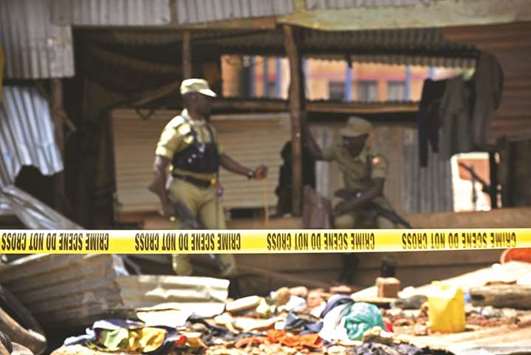Ugandan police stumbled upon a “radicalisation centre” at a Kampala mosque, shooting dead two people, arresting dozens and releasing over 100 women and children, officials said yesterday.
A security source, speaking on condition of anonymity, said officers had found what appeared to be an Islamist radicalisation centre inside the mosque.
The discovery came Friday as police offices followed a suspect, believed to have been involved in a high-profile kidnapping and murder earlier this year, into the city’s Usafi Mosque.
During an ensuing shoot-out, police said one officer was wounded, two men were shot dead and 36 arrested and accused of hoarding weapons.
Also inside the mosque were 18 women and 94 children that police said were being held against their will.
“A number of children and women, suspected to either have been kidnapped or held hostage, were rescued,” police spokesman Emilian Kayima told a press conference yesterday.
“Two of the hostage-takers were shot dead after violently attacking and severely injuring one of the security officers,” Kayima said, adding that the man who police had followed into the mosque was taken into custody.
Investigations into the connection between the original suspect and those found inside the mosque were continuing.
The arrested men — who police said were found with 23 machetes, 60 bullets and a bow and arrow — are suspected of involvement in the kidnapping and illegal detention of the women and children who come from various East African countries.
In February, the body of Susan Magara — a member of an influential Ugandan family — was found three weeks after her abduction and a string of ransom demands.
The crime shocked Ugandans and President Yoweri Museveni ordered intelligence agencies to lead an investigation.
Security forces believe that a key suspect who they had under surveillance realised he was being followed and bolted into the mosque.
Interior Minister Jeje Odong said officers chased the suspect into the mosque and that the subsequent discovery of weapons, women and children was not “planned or intended”.
“If the suspect had not gone into the mosque we would have had no reason to enter,” Odong said.
“We take strong exception to places of worship being used to commit crime.”
Odong said the children discovered inside “looked scared and traumatised” and appeared to be from Burundi, Rwanda and Kenya as well as Uganda.

Ugandan police officers secure a cordoned off site following a joint Uganda Police Force and Army security operation upon a ‘radicalisation centre’ at the Kampala Usafi mosque yesterday.
